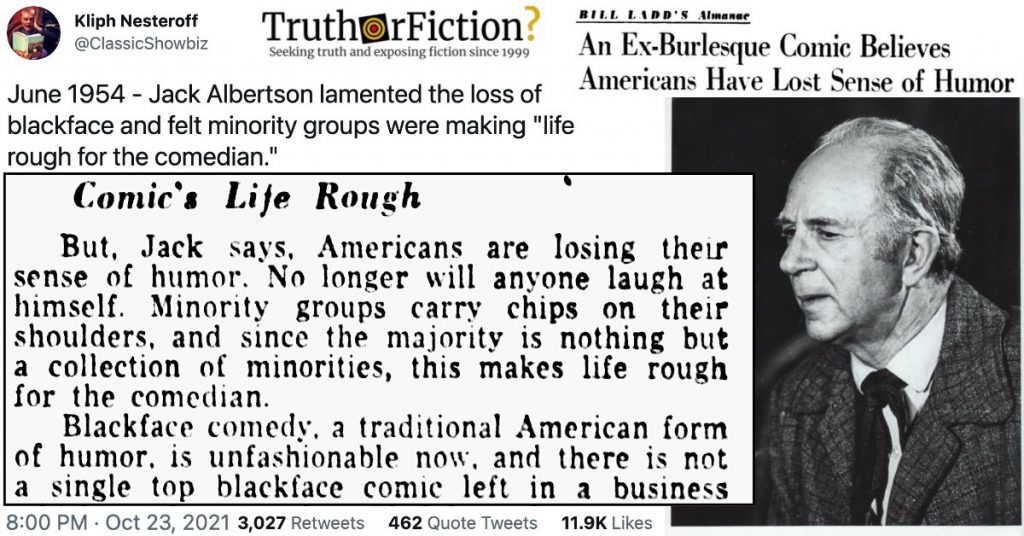On October 23 2021, Twitter user @ClassicShowbiz shared a purported archival clipping, which showed a newspaper excerpt dated 1954 newspaper excerpt quoting “ex-burlesque comic” Jack Albertson on Americans having “lost” their collective sense of humor:
An image on the right side of the tweet read:
BILL LADD’S Almanac An Ex-Burlesque Comic Believes Americans Have Lost Sense of Humor
By itself, the purported 1954 headline effectively complaining about “cancel culture” in 1954 would have likely been sufficiently interesting. But text on an image to the left expounded on Albertson’s point, specifically bemoaning the fact that the “traditional American form of humor” known as “blackface comedy” was waning in popularity:
Comic’s life rough
But, Jack says, Americans are losing their sense of humor. No longer will anyone laugh at himself. Minority groups carry chips on their shoulders, and since the majority is nothing but a collection of minorities, this makes life rough for the comedian.
Blackface comedy, a traditional American form of humor, is unfashionable now, and there is not a single top blackface comic left in a business …
That excerpt neither appeared nor circulated in a vacuum; it emerged during ongoing controversy around comedian Dave Chappelle, his new Netflix special, Netflix’s handling of the special, and myriad related issues.
Vox was predictably ready with an explainer on the controversy:
Many trans viewers feel Chappelle’s comedy has escalated into overt hate — and they’ve been voicing their complaints directly to Netflix. Moreover, Netflix recently suspended a trans employee who tweeted about the special’s transphobia. Netflix has said the employee was suspended not for her viral tweets, but for attending a director-level business meeting without an invitation. (The company has since lifted the suspension; another trans employee was fired after allegedly leaking budget information about Chapelle’s special.)
Despite the uproar, Netflix co-CEO Ted Sarandos defended Chappelle and his comedy. “We don’t allow titles on Netflix that are designed to incite hate or violence, and we don’t believe The Closer crosses that line,” he wrote in an internal email on October 8 [2021].
But with Chappelle platforming a position of gender essentialism onstage, and declaring that he’s “team TERF” — thereby aligning himself with trans-exclusionary radical feminists who argue that trans women aren’t women — many Netflix viewers and employees disagree. Netflix’s approach to the whole situation has triggered employee resignations, backlash, and now, a walkout of the company’s trans employee resource group and allies, held October 20 [2021]. Participating staff presented Netflix with a list of demands for boosting trans and nonbinary content on the platform and decreasing harm prior to the walkout— and while Netflix issued a statement of support, it’s unclear if any of them will be met.
On October 25 2021, NPR’s “Chappelle is unapologetic in his first public statement on ‘The Closer’ controversy” covered Chappelle’s reaction to the ongoing discussion, referencing a video statement shared by Chappelle to Instagram on October 25 2021:
Dave Chappelle is speaking out about the controversy surrounding his recent Netflix comedy special The Closer — saying he is open to meeting with LGBTQ employees of the company who are critical of the special, but says he will not be “bending to anyone’s demands.”
In a video clip posted to Instagram Monday, Chappelle remains unapologetic about the special, which includes transphobic material that has angered many in the LGBTQ community, at Netflix and beyond.
“I said what I said, and boy, I heard what you said. My God, how could I not? You said you want a safe working environment at Netflix. It seems like I’m the only one that can’t go to the office anymore,” he said in the five-minute video.
In short, Chappelle’s then-recent stand-up and its material reignited cyclical complaints that comedians in 2021 were increasingly unable to “be funny” due to oversensitive crowds and “woke mobs” attempting to “cancel” them. Consequently, claims that a 1954 article involved the exact same tenor of whining (on the subject of blackface, no less) seemed to undermine the entire assertion that Americans had become too sensitive.
However, a search to determine whether the Jack Albertson “blackface” commentary from 1954 was legitimate was initially unproductive. We did locate a September 19 2019 Tumblr post by u/oldshowbiz, featuring an identical partial quote:

